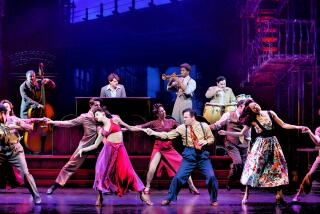A Milestone in ‘Ragtime’
TORONTO — In a score that borrows liberally from our country’s glorious musical heritage, from Scott Joplin to Stephen Foster to Stephen Sondheim, the new musical “Ragtime” captures what its title song promises: “an era exploding, a century spinning, in riches and rags, in rhythm and rhyme.”
Across the wide Apotex Theatre stage here, a large cast mimes the stubborn pageant of segregation and its inevitable collapse in the show’s great opening number, which separates the characters into three masses of energy--white Anglo, African American and new Jewish immigrants. Moving in blocks of gray, white and brown, the groups are pulled together, against their senses, by a force that the musical identifies in glorious harmony as ragtime.
From E.L. Doctorow’s 1975 novel, “Ragtime” illuminates the century’s end by reflecting on what went wrong at the beginning. Opening in 1902 and spanning two decades, the story is filled with events and themes that are remarkably familiar: violent protest against racial injustice, waves of new immigrants, a celebrity murder known as the “crime of the century” and, finally, a floating vision of a renewed, racially tolerant America. A family is forged out of misery by a Jewish artist, a white woman known as Mother who possesses untutored racial and ethnic sensitivity, and a black child orphaned by violence.
Doctorow’s book is something of a marvel, interconnecting as it does the great personalities that would define the ideas and obsessions of modern America, weaving a story for fictional characters among the lives of J.P. Morgan, Emma Goldman, Henry Ford, Booker T. Washington, Harry Houdini and Evelyn Nesbit.
“Ragtime,” the musical, had its world premiere Sunday at the Ford Centre for the Performing Arts. The news from Toronto is resounding. Despite a shrillness in its depiction of social protest, “Ragtime” is what it strives so spectacularly to be: a defining musical for the end of the American Century.
Scheduled for Broadway next fall, “Ragtime” is produced by the Canadian impresario Garth Drabinsky and his company, Livent. The solid creative team is American: lyricist Lynn Ahrens and composer Stephen Flaherty, whose most accomplished work has been the beautiful “Once on This Island;” book writer Terrence McNally (“Master Class,” “Love! Valour! Compassion!”); choreographer Graciela Daniele and director Frank Galati, not to mention the great work by Eugene Lee (sets); Jules Fisher and Peggy Eisenhauer (lights); Santo Loquasto (costumes) and the gifted orchestrator William David Brohn.
Though it handles its large canvas with beautiful assurance, “Ragtime” is not afraid to be small. Some of its most moving moments are quiet; one such number is a shimmering duet (“Sarah Brown Eyes”) between a musician and his lost love that is a jewel. This is a long show that understands there is strength in range.
As the 1981 movie version failed to do, “Ragtime” gives balance to all three stories that Doctorow co-mingled: those of a wealthy white family in a New York suburb, a black freedom fighter named Coalhouse Walker (the admirable Brian Stokes Mitchell) and a poor Jewish immigrant (Peter Friedman, also excellent) who remakes himself in Hollywood. Additionally, it deepens our understanding of two female characters, Mother (Marin Mazzie) and Sarah (Audra McDonald), who abandons her baby in bitter despair.
McDonald imbues her big song, “Your Daddy’s Son,” with a lovely voice and an ability to be despairing without self-pity. Mazzie displays the grace of her infinitely graceful character. Her second-act number, “Back to Before,” contains perhaps the show’s most well-crafted lyric; it limns the dissolution of a marriage as well as that of the white upper middle-class complacency into which the marriage was born.
As Father, a well-intentioned man unable to comprehend the subtleties of the new century, Mark Jacoby also is very good. Jim Corti is memorable as the quietly charismatic Houdini and Lynette Perry is terrific as Evelyn Nesbit.
The characters with a pronounced social conscience don’t fare as well. As Mother’s increasingly angry Younger Brother, Steven Sutcliffe is a cardboard cutout, and Camille Saviola’s Emma Goldman fares only slightly better. Ahrens’ lyrics grow stale and sappy for these characters.The worst song in the score is “He Wanted to Say,” a mind-numbingly obvious number for freedom fighters of all races.
Though Act 2 gets laden down with the protracted sloganeering, on both the parts of the score and the book, “Ragtime” lands on its feet with a final, stirring reprise.
Act 1 sails by in a dream of good storytelling. In one heart-stopping scene, Coalhouse introduces the white family to ragtime and at the same time courts a formerly intractable Sarah. As he plays slowly at the piano, the household is transfixed.
It’s a great moment, one in which people are absorbed in their emotions and yet are changing before our eyes. That is the magic of ragtime and of “Ragtime,” which soon no doubt will hold all lovers of musical drama in the grip of its inevitable notes.
* “Ragtime,” Apotex Theatre, Ford Centre for the Performing Arts, North York, Toronto. Running time: 3 hours. (416) 872-2222.
More to Read
The biggest entertainment stories
Get our big stories about Hollywood, film, television, music, arts, culture and more right in your inbox as soon as they publish.
You may occasionally receive promotional content from the Los Angeles Times.










